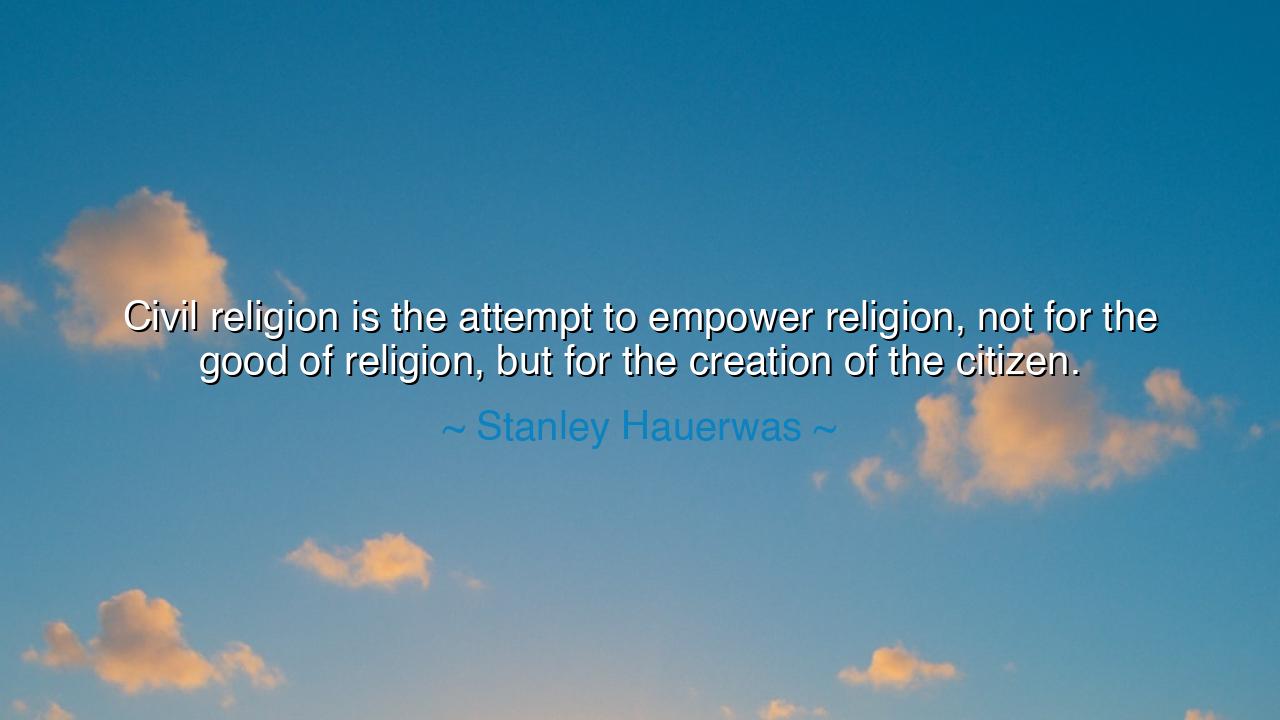
Civil religion is the attempt to empower religion, not for the
Civil religion is the attempt to empower religion, not for the good of religion, but for the creation of the citizen.






Hear, O seeker of wisdom, the words of the teacher Stanley Hauerwas: “Civil religion is the attempt to empower religion, not for the good of religion, but for the creation of the citizen.” These words are heavy with fire, forged in the struggle between faith and empire, between the soul’s devotion to the Eternal and the state’s hunger for loyalty. They speak of a danger most subtle: that sacred truth is bent, reshaped, and wielded—not to glorify God, nor to nurture the soul—but to mold obedient subjects, citizens fashioned for the needs of power rather than for the freedom of heaven.
In ages past, rulers learned that to command armies and to govern nations, law alone was not enough. The heart of man must be bound, not only his hands. Thus was born the ancient art of civil religion, wherein the state borrows the robes of the divine, weaving ceremonies, pledges, and myths that stir the soul with the fervor of faith. But its altar is not raised to the Living God; it is raised to the city, the nation, the republic. Here, religion is stripped of its holy wildness, its prophetic cry, and is instead yoked like an ox to the plow of statecraft.
Behold the tale of Rome. In the days of the Caesars, the empire stretched vast as the horizon, and unity was demanded from countless peoples. What bound them together? Not law alone, nor sword alone, but ritual—burning incense to the emperor, declaring Caesar lord. This was not religion for the salvation of souls, but religion reshaped to sanctify empire, to forge the obedient citizen. And those who would not bow, like the early Christians, stood accused not of impiety but of treason. Thus, the faith that sought the Kingdom of God became the enemy of the kingdom of men.
Even in lands more recent, where freedom was the banner, the temptation endured. In America, the language of covenant and promise was borrowed from the Hebrew prophets, woven into the fabric of the republic. Presidents swore oaths with sacred words; songs of the land echoed like hymns. Yet this too, Hauerwas warns, was a bending of religion—not to guide men heavenward, but to give divine shine to the project of nation-making. The flag stood as icon; the pledge as liturgy; the battlefield as altar where lives were laid down in sacrifice to the state.
Let us not despise patriotism nor love of homeland, for these are noble in their place. But we must hear the warning: when religion is harnessed, when its transcendent fire is pressed into the mold of the state, both are corrupted. The state gains a false aura of divinity, and religion loses its prophetic edge, its power to challenge kings and empires alike. The prophet becomes chaplain, the sacred becomes civil, and the people mistake the city of man for the City of God.
Learn then from this: the soul must discern between true worship and civic ritual. The faithful heart must love neighbor and land, but never confuse the voice of God with the voice of empire. When rulers call upon the sacred to sanctify their power, the wise must ask: is this for the good of the soul, or only for the making of citizens? If the latter, then beware, for you are witnessing the ancient trap of civil religion.
So what must the seeker of truth do? First, guard your heart. Do not surrender your faith to slogans or symbols of the state. Second, be courageous as the martyrs of old, who honored Caesar where honor was due, but refused to call him Lord. Third, live as a citizen of two realms: loyal to your land, yet above all faithful to the Kingdom of God, which cannot be co-opted nor domesticated.
Thus, O child of tomorrow, carry this lesson: religion must serve the good of the soul and the glory of the Divine, not the ambitions of rulers. Let your devotion remain free, prophetic, and untamed, lest you be fashioned into a mere citizen when you were born to be far more—a child of eternity. Walk with wisdom, honor the Eternal, and let no empire steal your worship.






AAdministratorAdministrator
Welcome, honored guests. Please leave a comment, we will respond soon